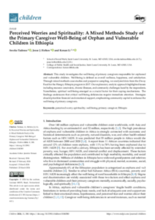This study investigates the well-being of primary caregivers responsible for orphaned and vulnerable children in Ethiopia. Well-being is defined as overall wellness, happiness, and satisfaction.
Through mixed methods case studies and purposive sampling, the authors analyzed data from the Ziway Food for the Hungry Ethiopia program in 2017. Their explanatory analytic approach highlighted issues including resource constraints, chronic illnesses, and community challenges faced by the respondents. Nonetheless, spiritual well-being emerged as a crucial factor for their coping mechanisms.
The findings underscore that critical well-being deficiencies require immediate attention. Strategies should prioritize financial and emotional support, emphasizing community capital to enhance the well-being of primary caregivers.

